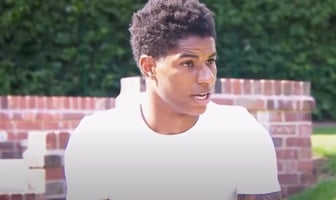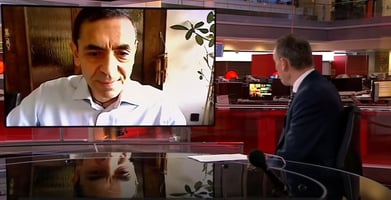Without scoring a goal or even kicking a ball, Marcus Rashford became one of the heroes of the...
We've reached day three in our look back at the spokespeople who got right in 2020.
There has been a scientific feel to our selections so far, with professors Jonathan Van-Tam and Sarah Gilbert included in the first two days.
But today we've chosen someone from a different profession who has had a huge impact during the past 12 months.
The striker who nutmegged the government
Without scoring a goal or even kicking a ball, Marcus Rashford became one of the heroes of the lockdown.
The Premier League star’s campaigning helped more than a million disadvantaged children get access to a free meal during the school summer holidays.
His passionate appeal to have England’s free school meal voucher scheme extended ultimately triggered two government U-turns.
And his efforts have been described as a ‘PR masterclass’.
One of the crucial parts of his success was his willingness to share his own story - something we stress during our media training courses.
He had experienced hunger as a child and he was willing to talk about it.
In an interview with BBC Breakfast, he recalled his mum shopping in a discount store and going to friends’ houses when there wasn’t any food on his table.
He said: “What families are going through now, I once went through that same system. I remember we used to go to a shop called Pound World and everything was under a pound and we would sort of schedule out the week – so we’d get seven yoghurts and you can have one yoghurt a day and so on.
“If there was food on the table, there was food on the table. If there wasn’t, I had friends who understood my situation.”
Human stories, particularly those which are personal to a spokesperson, help capture the audience’s attention.
They stimulate emotions, persuade them to give money, take action, support an idea or buy a product – talking about policies and procedures does not have the same impact.
Everyone has stories to tell and the more detail you are prepared to tell the more impactful they will be.
Wow....from mere footballer to pioneering social campaigner.
— Martin Turner (@martingturner) June 16, 2020
This why sport and sports stars matter - when they can use their voices to highlight important causes and when their voices are ‘authentic’. Marcus, you are a star.#maketheUturn #rashford https://t.co/xcdZLVlHrn
This interview with Rashford is so refreshing and authentic. It’s brilliant to hear a footballer use their influence for the greater good. https://t.co/OTpMTrO2eB
— Darren Cohen (@DarrenWCohen) June 15, 2020
Another key to the footballer’s success was the simplicity of the message – we need to support children and families experiencing food poverty.
Simplicity is key when it comes to creating a message that resonates and stirs people into action. You’ll often hear people talk about the importance of ‘three key messages’. It is a common media training tip.
But the reality is the audience is unlikely to remember more than one major point you make.
And this message was supported by a creative use of numbers.
He said: “This summer should have been filled with pride once more, parents and children waving their flags, but in reality, Wembley stadium could be filled more than twice with children who have had to skip meals during lockdown due to their families not being able to access food.”
Why is this good? Because numbers work best when they are used in a way that allows the audience to visualise them.
Most of us will be able to picture how big Wembley is and to think it can be filled more than twice with hungry children, helps us to picture the scale of the issue.
- Examples, anecdotes and personal stories are crucial in bringing interviews and messages to life and showing the human side of spokespeople.
- Focus on establishing one key message. Once you have a clear message, stick to it and repeat it in media interviews.
- Use numbers creatively in media interviews. People will struggle to remember exact figures, but they will recall comparisons, such as Wembley being filled twice.
Who will feature next in our selection of the best interviews and spokespeople of 2020? We will reveal the fourth person on Friday.
About to face the media? Get your media interview homework off to the best start by downloading your copy of our free media interview preparation eBook.
Media First are media and communications training specialists with over 35 years of experience. We have a team of trainers, each with decades of experience working as journalists, presenters, communications coaches and media trainers.
Subscribe here to be among the first to receive our blog.




